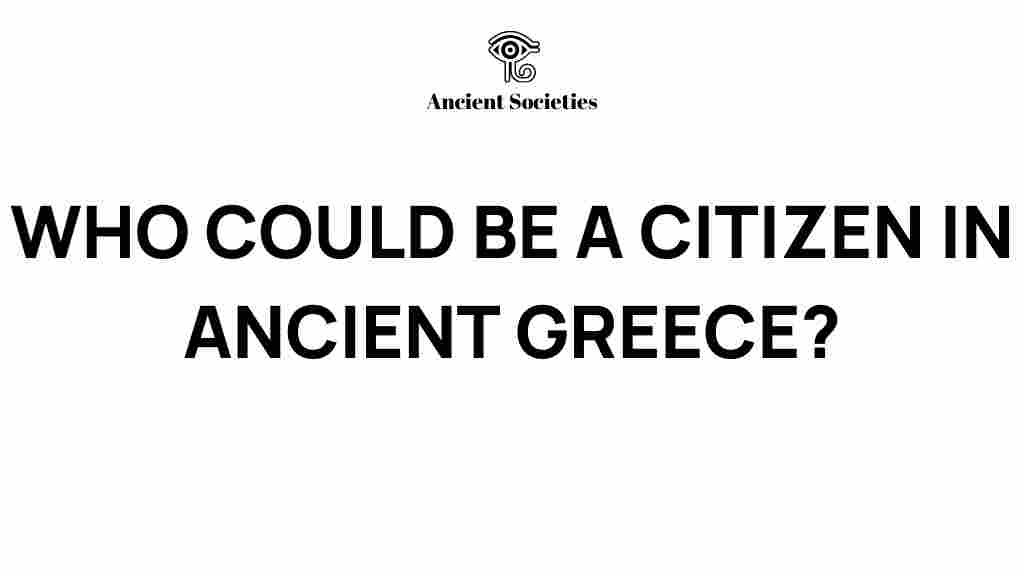Unveiling the Mystery: Who Could Claim Citizenship in Ancient Greece?
Ancient Greece, a cradle of democracy, philosophy, and culture, has long fascinated historians and enthusiasts alike. The concept of citizenship in Ancient Greece is essential to understanding its society, politics, and the rights afforded to individuals. This article explores the intricate web of citizenship in Ancient Greece, highlighting who qualified for this status, the historical context, and the implications of exclusion from citizenship.
The Foundation of Citizenship in Ancient Greece
Citizenship in Ancient Greece was not merely a legal status; it was a fundamental aspect of identity. The rights and responsibilities that came with citizenship were deeply intertwined with the functioning of city-states, known as polis, which were the heart of Greek society.
- Definition of Citizenship: In Ancient Greece, citizenship typically referred to free-born males who were members of a polis.
- Rights of Citizens: Citizens enjoyed various rights, including participation in political life, owning property, and the right to a fair trial.
- Responsibilities: Along with rights came responsibilities, such as military service and civic duties.
Who Were Considered Citizens?
Understanding who could claim citizenship in Ancient Greece requires delving into the criteria that defined citizenship across different city-states. While Athens is often highlighted for its democratic ideals, other city-states like Sparta had different norms and practices.
Athenian Citizenship
In Athens, citizenship was highly valued, but also strictly regulated. The following criteria were necessary for Athenian citizenship:
- Birthright: Athenian citizenship was reserved for males born to Athenian parents. This requirement ensured that only those with Athenian lineage could participate in civic life.
- Age: Citizens were typically required to be at least 18 years old to participate in the Assembly and vote.
- Freedom: Only free men could claim citizenship. Enslaved individuals and those who were born into slavery were excluded.
Spartan Citizenship
In contrast, Sparta had a more militaristic approach to citizenship. Spartan citizens, known as Spartiates, were part of a rigid social structure. Key aspects included:
- Agoge Training: Spartan males underwent rigorous military training known as the Agoge, which was crucial to their status as citizens.
- Land Ownership: Citizenship was often tied to land ownership and the ability to support oneself through agriculture.
Women, Slaves, and Foreigners: The Excluded
While citizenship in Ancient Greece conferred numerous rights and privileges, significant portions of the population were systematically excluded:
Women
In most city-states, women were not granted citizenship. Their roles were largely confined to the domestic sphere, and they were excluded from political participation:
- Political Exclusion: Women could not vote, hold office, or participate in the Assembly.
- Social Status: Women were often viewed primarily as daughters or wives, with their status linked to the male citizens of their family.
Slaves
Slavery was a common practice in Ancient Greece. Slaves, regardless of their skills or intelligence, were considered property and had no claim to citizenship:
- Rights of Slaves: Slaves had no legal rights and were subject to the whims of their owners.
- Potential for Freedom: Some slaves could earn their freedom, but this did not grant them citizenship.
Foreigners
Foreigners, or metics, played crucial roles in the economy and culture of Ancient Greece but were excluded from citizenship:
- Economic Contribution: Metics often engaged in trade and crafts, contributing to the polis’s wealth.
- Social Status: While metics could live and work in a polis, they lacked political rights and could not own land.
The Role of Democracy in Citizenship
Democracy in Ancient Greece, particularly in Athens, was a revolutionary concept. However, it was a democracy that functioned within a framework of exclusion:
- Direct Participation: Citizens had the opportunity to participate directly in governance through the Assembly and other civic institutions.
- Political Rights: The right to vote and hold office was exclusive to male citizens, reinforcing the exclusion of women and other groups.
Historical Context of Citizenship
The evolution of citizenship in Ancient Greece is closely tied to its historical developments:
- Rise of City-States: The establishment of city-states led to the development of distinct citizenship laws and practices.
- Impact of War: Wars, such as the Peloponnesian War, influenced citizenship by altering populations and the need for military service.
- Philosophical Thought: Thinkers like Aristotle contributed to discussions about citizenship, rights, and the nature of justice.
Contemporary Reflections on Ancient Greek Citizenship
The concepts of citizenship in Ancient Greece continue to influence modern political thought and discussions about rights and exclusion:
- Modern Citizenship: Today, citizenship is often linked to legal status, but the principles of rights and responsibilities remain relevant.
- Inclusion vs. Exclusion: The historical exclusions in Ancient Greece provoke contemporary debates about who is considered a citizen in modern democracies.
Troubleshooting Common Misunderstandings
As we navigate the complexities of citizenship in Ancient Greece, several misunderstandings frequently arise:
- Misconception 1: All residents of Ancient Greece were citizens.
In reality, citizenship was limited to free-born males, with women, slaves, and foreigners excluded. - Misconception 2: Athenian democracy was entirely inclusive.
While Athens is celebrated for its democratic practices, it was exclusive in terms of citizenship, limiting participation to a small segment of the population. - Misconception 3: Citizenship equated to full rights for all men.
Even among male citizens, there were hierarchies and distinctions that affected rights and expectations.
Conclusion
The question of who could claim citizenship in Ancient Greece reveals a complex interplay of rights, responsibilities, and societal norms. The exclusion of women, slaves, and foreigners highlights the limitations of Athenian democracy and the political structures of other city-states. Understanding the historical context of citizenship in Ancient Greece not only deepens our appreciation for its rich culture and history but also prompts us to reflect on contemporary issues of citizenship and inclusion.
For more insights into ancient societies and their impact on modern culture, visit this resource. To explore further discussions on citizenship and democracy, check out this article.
This article is in the category History and created by AncientSocieties Team
